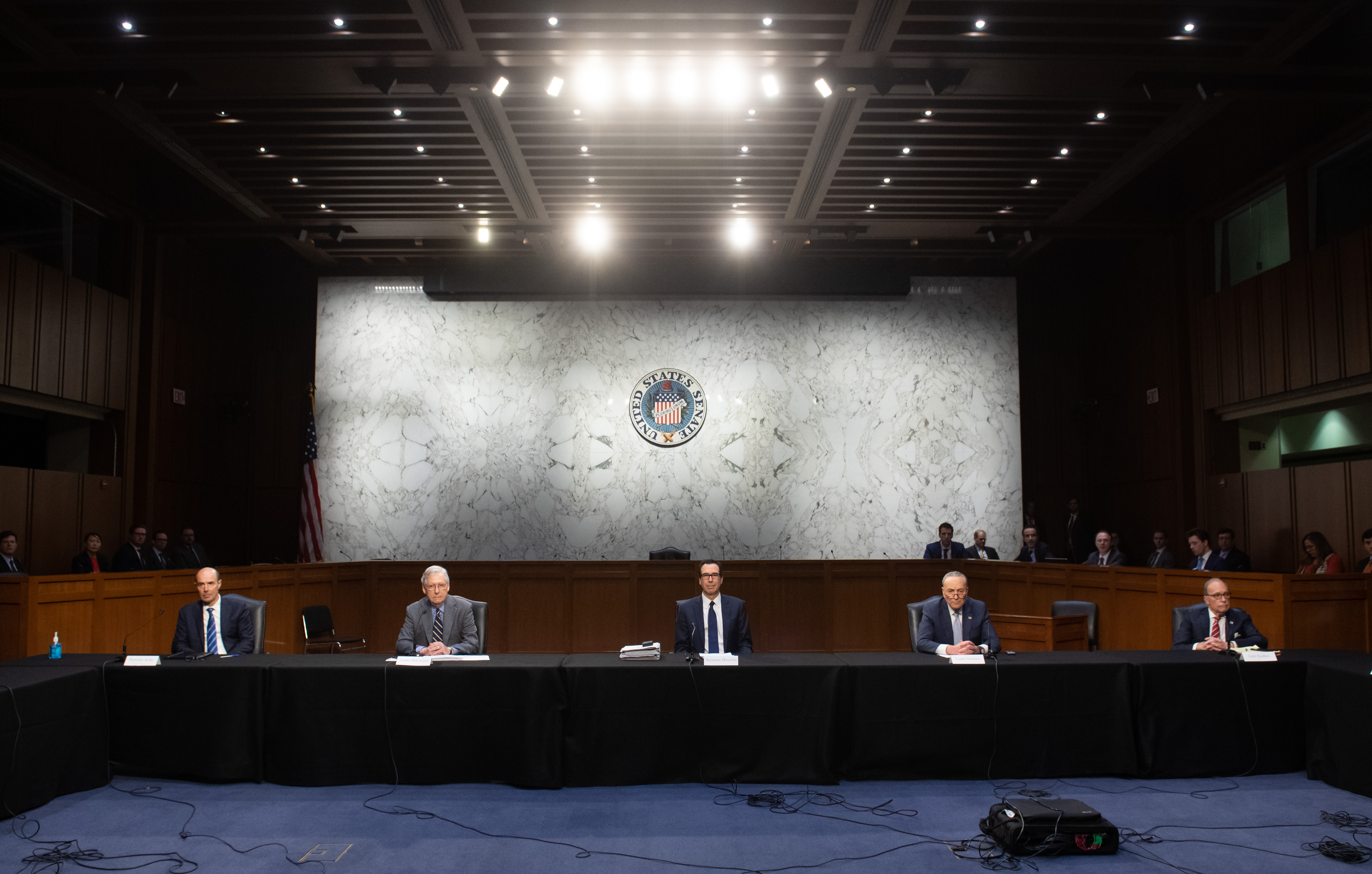Congress, White House reach agreement on $2 trillion coronavirus economic rescue bill


A free daily email with the biggest news stories of the day – and the best features from TheWeek.com
You are now subscribed
Your newsletter sign-up was successful
"Ladies and gentlemen, we are done," White House legislative affairs director Eric Ueland said early Wednesday, after five days of intense talks with congressional leaders about a coronavirus economic rescue bill. "We have a deal." The $2 trillion deal includes money for most Americans, $367 billion for small businesses who continue to pay employees forced to stay home, $130 billion for hospitals, and a $500 billion loan program for corporations, states, and local governments. If passed, this will be the third bill Congress has passed to stem the economic fallout of the COVID-19 pandemic. It will also be the largest economic rescue bill ever passed by Congress.
The deal was negotiated by Ueland, Treasury Secretary Steven Mnuchin, Senate Majority Leader Mitch McConnell (R-Ky.), and Senate Minority Leader Chuck Schumer (D-N.Y.), who was in frequent contact with House Speaker Nancy Pelosi (D-Calif.). At the insistence of Democrats, the legislation includes an independent inspector general and an oversight board for the $500 billion loan program, as well as other protections.
Democrats also secured a provision to expand unemployment insurance with broader eligibility, including for gig-economy workers, and an extra $600 a week for four months. As with McConnell's draft, U.S. adults will get $1,200 with an extra $500 for each child. The Senate is expected to pass the legislation swiftly, but the House is on recess and that timeline is less clear.
The Week
Escape your echo chamber. Get the facts behind the news, plus analysis from multiple perspectives.

Sign up for The Week's Free Newsletters
From our morning news briefing to a weekly Good News Newsletter, get the best of The Week delivered directly to your inbox.
From our morning news briefing to a weekly Good News Newsletter, get the best of The Week delivered directly to your inbox.
Pelosi, who will shelve the House's more generous package in favor of the Senate bill, is hoping to pass the legislation by unanimous consent, sparing members a trip back to Washington. But any House member can derail that plan, and the likely alternative is a floor vote held open for several days so lawmakers wary of contracting COVID-19 can vote in socially distanced shifts.
A free daily email with the biggest news stories of the day – and the best features from TheWeek.com
Peter has worked as a news and culture writer and editor at The Week since the site's launch in 2008. He covers politics, world affairs, religion and cultural currents. His journalism career began as a copy editor at a financial newswire and has included editorial positions at The New York Times Magazine, Facts on File, and Oregon State University.
-
 Political cartoons for February 14
Political cartoons for February 14Cartoons Saturday's political cartoons include a Valentine's grift, Hillary on the hook, and more
-
 Tourangelle-style pork with prunes recipe
Tourangelle-style pork with prunes recipeThe Week Recommends This traditional, rustic dish is a French classic
-
 The Epstein files: glimpses of a deeply disturbing world
The Epstein files: glimpses of a deeply disturbing worldIn the Spotlight Trove of released documents paint a picture of depravity and privilege in which men hold the cards, and women are powerless or peripheral
-
 TikTok secures deal to remain in US
TikTok secures deal to remain in USSpeed Read ByteDance will form a US version of the popular video-sharing platform
-
 Unemployment rate ticks up amid fall job losses
Unemployment rate ticks up amid fall job lossesSpeed Read Data released by the Commerce Department indicates ‘one of the weakest American labor markets in years’
-
 US mints final penny after 232-year run
US mints final penny after 232-year runSpeed Read Production of the one-cent coin has ended
-
 Warner Bros. explores sale amid Paramount bids
Warner Bros. explores sale amid Paramount bidsSpeed Read The media giant, home to HBO and DC Studios, has received interest from multiple buying parties
-
 Gold tops $4K per ounce, signaling financial unease
Gold tops $4K per ounce, signaling financial uneaseSpeed Read Investors are worried about President Donald Trump’s trade war
-
 Electronic Arts to go private in record $55B deal
Electronic Arts to go private in record $55B dealspeed read The video game giant is behind ‘The Sims’ and ‘Madden NFL’
-
 New York court tosses Trump's $500M fraud fine
New York court tosses Trump's $500M fraud fineSpeed Read A divided appeals court threw out a hefty penalty against President Trump for fraudulently inflating his wealth
-
 Trump said to seek government stake in Intel
Trump said to seek government stake in IntelSpeed Read The president and Intel CEO Lip-Bu Tan reportedly discussed the proposal at a recent meeting
